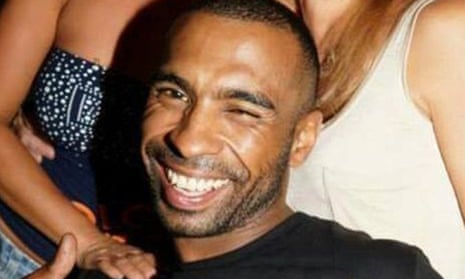An official review into the death of a black man who was punched repeatedly by police, beaten with a baton and Tasered has been delayed for the last year because investigators have yet to obtain a transcript of the inquest.
Campaigners said the “unacceptable” hold up of the inquiry into the death of Darren Cumberbatch, 32, delivered the “message that the life of a black man is not valued”.
Cumberbatch died of multiple organ failure in hospital in July 2017 after being arrested by police at a probation hostel in Nuneaton, west Midlands. His family say the electrician’s body was covered in bruises and “strange marks” when they visited him in hospital, where he died nine days after being apprehended. The incident prompted a series of marches for justice in Coventry, Cumberbatch’s home city.
An inquest heard he was punched 15 times by officers, and that police restraint, including use of Tasers and batons, contributed to Cumberbatch’s death. The coroner said the level of restraint used by Warwickshire Police was “excessive”. After the inquest concluded in June last year, the independent police watchdog pledged to “review the findings” of its investigation, not yet made public, into Cumberbatch’s death.
However, the Independent Office for Police Conduct (IOPC) has now admitted to the Observer that it has failed to even acquire the transcript of the high-profile inquest.
Birmingham campaigner, the Rev Desmond Jaddoo, representing the Cumberbatch family, said he was left almost speechless by the inability to obtain a record of the coroner’s court. “It’s not good enough, it speaks for itself,” he said, adding the case had eroded trust in the police in a city which last week saw thousands of demonstrators protest about the death of George Floyd in US police custody.
Deborah Coles, director of the charity Inquest, said: “Demonisation, obfuscation, delay and denial are the reality for bereaved families seeking justice. It is unacceptable that a year on from the inquest finding that police restraint was excessive force, those investigating this have done nothing.”
Coles added: “This sends out a message that the life of a black man is not valued. This is not just an issue in the US. Darren’s death is one of a pattern of deaths synonymous with state violence, structural racism, injustice and impunity.”
Further marches against police brutality are planned in Birmingham later this month where protestors will remember Cumberbatch and others, including former footballer Dalian Atkinson, who died after officers Tasered and physically restrained him.

In October 2018, the IPOC said it had completed its investigation into Cumberbatch, shared it with his family, and that its publication would “await the conclusion of an inquest”. However, following the inquest the watchdog announced it wanted to “review” the investigation’s findings.
An IOPC spokesperson said: “To do so effectively we require a transcript of the coroner’s court proceedings to progress this work further.”
They added: “We have been chasing this since last year and we now understand that a transcript is being prepared. It is essential that we compare the information given in detailed live evidence at the inquest with that evidence gathered during our investigation.”
